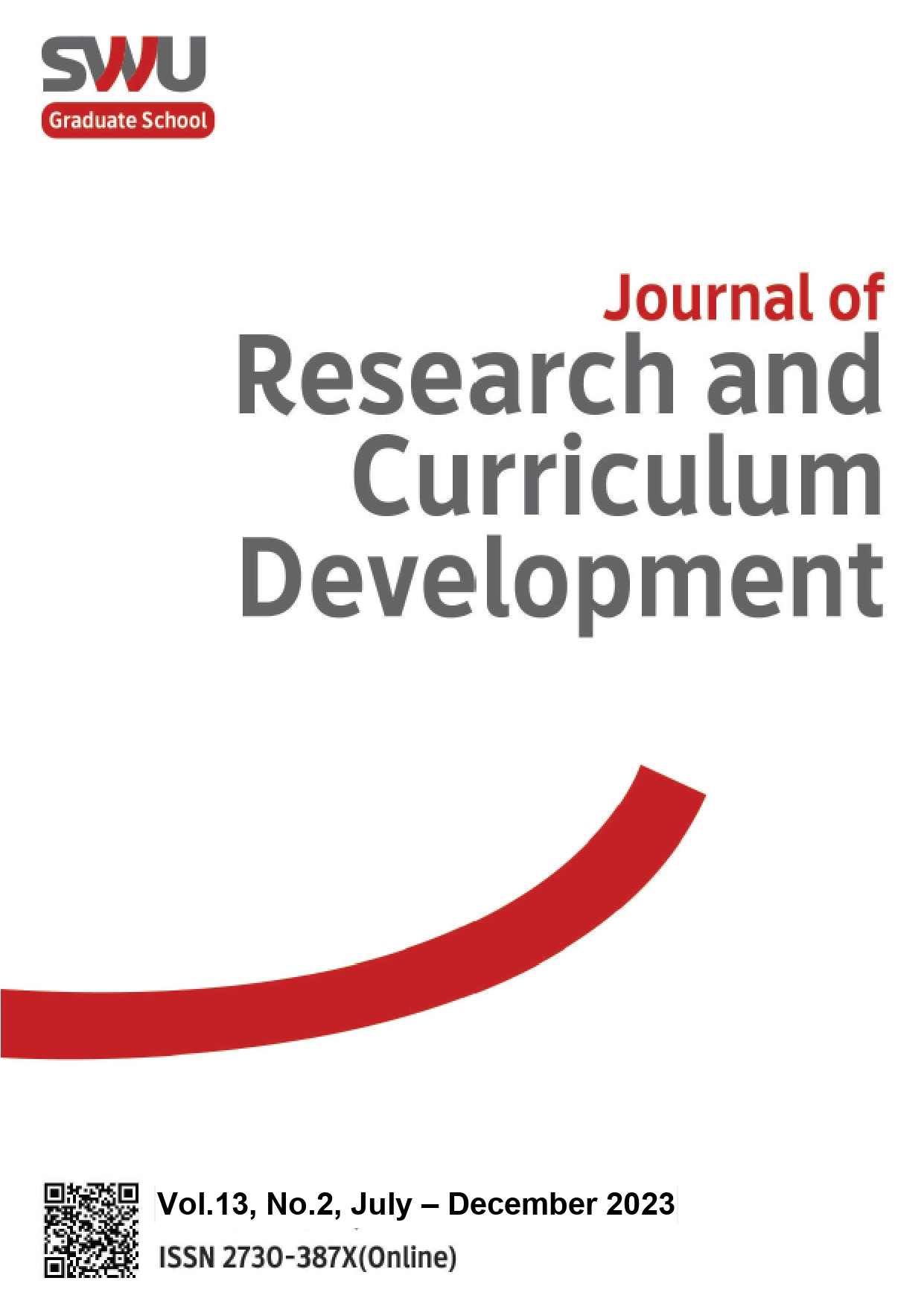The Development of Chemistry Instructional Handbook by Blended Learning to Enhance Achievement on Chemistry and Science Process Skill for Vocational Certificate (skill bridging program) of Polytechnic Institute of Banteay Meanchey Province, Kingdom of Cambodia
Abstract
The research objectives are as follows: (1) to develop an instructional chemistry handbook by blended learning for skill bridging program of the Polytechnic Institute of Banteay Meanchey Province in the Kingdom of Cambodia; (2) to study science process skills among students who learned with chemistry instructional handbook on blended learning; (3) to compare achievement on chemistry learning before and after learning with an instructional chemistry handbook on blended learning; (4) to study the satisfaction of teachers who used an instructional chemistry handbook of blended learning. The 40 samples were vocational certificate students and two teachers from a Polytechnic Institute of Banteay Meanchey Province, using sample and random sampling. The implement lasted for seven weeks. The data were statistically analyzed using mean, standard deviation, and a dependent t-test. The instruments used for gathering the data were as follows: (1) the chemistry instructional handbook by blended learning; (2) science process skill test; (3) pretest and posttest; and (4) teacher satisfaction. The research findings were as follows: (1) the result of the instructional chemistry handbook on blended learning and had 10 components; (2) the results of studying science process skill of the students who learned with instructional chemistry handbook by blended learning. In Unit One, science process skills were moderate (=3.30, S.D.=0.55), in Unit Two of an science process skill were high (=3.51, S.D.=0.50); in terms of Unit Three, science process skill were high (=3.75, S.D.=0.54), in Unit Four, the science process skill were high (=4.10, S.D.=0.50), which accepted the research hypothesis; (3) the result of comparison of achievement on chemistry learning before and after learning with instructional chemistry handbook on blended learning are difference levels of statistical significance of .05; (4) the result of studying teacher satisfaction with an instructional chemistry handbook on blended learning was at a level of “high”.
References
Abungu, H. E., Okere, M. I. O., & Wachanga, S. W., (2014). The effect of science process skills teaching approach on secondary school students’ achievement in chemistry in Nyando District, Kenya. Journal of Educational and Social Research, 4(6). Doi: 10.5901/jesr. 2014.v4n6p359
Akinbobola, A. O., & Afolabi, F. (2010). Analysis of science process skills in West African senior secondary school certificate physics practical examinations in Nigeria. American-Eurasian Journal of Scientific Research, 5(4), 234-240.
Bailey, Keith D. (2003). The effects of learning strategies on student interaction And Student Satisfaction. Dissertation Abstract international, 63(7). (UMI No. 3060010).
Bentea, C. C., & Anghelache, V. (2012). Teacher’s motivation and satisfaction for professional activity. Procedia - Social and Behavioral Sciences, 33(2012), 563 – 567.
Carroll, J. B.,(1989). The carroll model: A 25-year retrospective and prospective view. Educational Researcher, 18(1), 26-31.
Chebii, R. J. (2008). Effects of science process skills mastery learning approach on secondary school students’ achievement and acquisition of selected chemistry practical skills in Koibatek District Schools. Creative Education, 3(8), 1291-1296.
Duangtillee, K. (2017). Development of manual for application on smartphones and tables for science teachers in secondary schools. Pitsanulok: Naresuan University.
Feyzioglu, B., Demirdag, B., Akyildiz, M., & Altun, E. (2012). Studied about developing a of a science process skills test for secondary students: validity and reliability study. Educational Sciences: Theory & Practice, 12(3), 1989-1906.
Joseph, B. (2016). Partnership for 21st century learning. Retrieved from https://files.eric.ed.gov/fulltext/ED519462.pdf
Kavitha, R., & Jaisingh, W. A. (2018). Study on the student experiences in blended learning environments. International Journal of Recent Technology and Engineering, 7(4S), 2277–3878.
Ketut, B. A., & Hartinawati,. H. (2021). The effectiveness of blended learning for new generation learning materials to train science process skills. Science and Research Journal, 4(2), 63-71.
Qayyum, N. U., Shaik, M. S., Ali, A. M., & Bebi, C. V. (2012). Study of blended learning process in education context. Modern Education and Computer Science, 9, 23-29.
Simpson, M. & Anderson, B. (2009). Redesigning initial teacher education. In E. Stacey & P. Gerbic(Eds.), Effective blended learning practices. Evidence based perspectives in ICT-facilitated education, (pp. 62-78). Hershey PA: Information Science Reference.
Downloads
Published
How to Cite
Issue
Section
License

This work is licensed under a Creative Commons Attribution-NonCommercial-NoDerivatives 4.0 International License.


